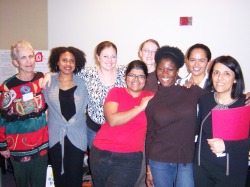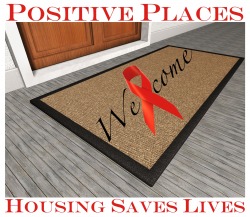Positive Places: Housing for People Living with HIV/AIDS in DC
About Us
1. Who are we?
a. Where will the money come from?
Monies are federally appropriated, though we are asking for further funding from DC City Council. Money spent on AIDS housing has been proven to be cost effective both in the long and short term. Long term effects prevent further transmission of HIV/AIDS and improve the health of PLWHA, greatly reducing health costs and a return rate of $3 per $1 spent on stable housing efforts. Short term, it lowers the cost of monthly care for homeless PLWHA, which are otherwise passed onto the state through hospital stays and Medicaid/Medicare.
b. Why is HIV/AIDS different than other chronic health conditions common in homeless communities?
HIV is an auto-immune disease that is affected by many conditions specific to homeless populations such as exposure to heat and cold, communicable diseases common in temporary shelters, and pneumonia. That makes this population particularly vulnerable to illness, which their bodies are unable to fight due to altered immune systems. While other homeless persons with chronic health conditions are surely in need of support, homeless PLWHA are facing life-or-death situations by sleeping on the streets or in shelters. HIV/AIDS still a sexually communicable disease with specific indicators such as viral loads, CD4 counts and opportunistic infections that distinguishes them from being HIV positive and having AIDS.
c. Will homeless PLWHA ‘jump the line’ in front of those who have been waiting for housing for years?
No. HOPWA funding is completely separate from other funding sources such as Section 8 which is a federal housing program designed to assist low-income persons and families in obtaining stable housing. Since the funding sources are completely separate, HOPWA recipients will not prevent others from receiving housing funds from separate programs.
- Positive Places is a subcommittee within the Health Disparities Committee of the Metro Washington Public Health Association in Washington DC.
- We are an advocacy group fighting for stable housing for homeless people living with HIV/AIDS (PLWHA).
- We want to end the waitlist of 440 people in the District who are waiting to obtain secure housing through Housing Opportunities for People With AIDS (HOPWA)
- We see housing as a Human Rights and a public health prevention issue. As a Human Rights City, Washington DC should be a leader in stable housing opportunities. We want to encourage both the community and DC City Council to honor the city’s previous declaration to honor the International Bill of Human Rights, which includes housing.
- We are supported by the following organizations: Housing Works, Metro Washington Public Health Association, National AIDS Housing Coalition, DC Fights Back, (National Law Center for Homelessness and Poverty and Empower DC… these two an be added once they come on board)
- Housing Opportunities for People with HIV/AIDS is a federally funded program given to cities across the U.S. based on community need. In FY 2008, DC received over $11.5 million.
- In DC, these funds are managed primarily by the DC Dept. of Health’s HIV/AIDS Association (HAA) as well as 5 other organizations in the Metro area.
- Funds are used for “the acquisition, rehabilitation, or new construction of housing units; costs for facility operations; rental assistance; and short-term payments to prevent homelessness” (HOPWA, 2009).
- Currently, there are over 440 homeless PLWHA on the streets and shelters of DC who have been approved and are still waiting for HOPWA housing assistance.
- Stable housing increases life expectancy and decreases viral loads of PLWHA, increasing their quality of life.
- PLWHA that obtain stable housing are less likely to engage in high-risk transmission behavior such as intravenous drug use, sharing needles, unprotected sexual encounters, and multiple concurrent sexual partners.
- Obtaining supportive housing is independently associated with 80% reduction in mortality (Observational study of 676 PLWHA in San Francisco
- An 18 month Housing and Health study conducted by Center for Disease Control and HOPWA program showed 37% reduction in ER visits and 57% reduction in hospitalization. Additionally the homeless were 2.5 times more like to use the ER and 2.8 times more like to have a detectable viral load
- Research consistently shows significant positive association between improved housing status and better HIV-related health including CD4, lower viral loads and lesser co-infections with Hepatitis C or TB.
a. Where will the money come from?
Monies are federally appropriated, though we are asking for further funding from DC City Council. Money spent on AIDS housing has been proven to be cost effective both in the long and short term. Long term effects prevent further transmission of HIV/AIDS and improve the health of PLWHA, greatly reducing health costs and a return rate of $3 per $1 spent on stable housing efforts. Short term, it lowers the cost of monthly care for homeless PLWHA, which are otherwise passed onto the state through hospital stays and Medicaid/Medicare.
b. Why is HIV/AIDS different than other chronic health conditions common in homeless communities?
HIV is an auto-immune disease that is affected by many conditions specific to homeless populations such as exposure to heat and cold, communicable diseases common in temporary shelters, and pneumonia. That makes this population particularly vulnerable to illness, which their bodies are unable to fight due to altered immune systems. While other homeless persons with chronic health conditions are surely in need of support, homeless PLWHA are facing life-or-death situations by sleeping on the streets or in shelters. HIV/AIDS still a sexually communicable disease with specific indicators such as viral loads, CD4 counts and opportunistic infections that distinguishes them from being HIV positive and having AIDS.
c. Will homeless PLWHA ‘jump the line’ in front of those who have been waiting for housing for years?
No. HOPWA funding is completely separate from other funding sources such as Section 8 which is a federal housing program designed to assist low-income persons and families in obtaining stable housing. Since the funding sources are completely separate, HOPWA recipients will not prevent others from receiving housing funds from separate programs.
2009-2010 members

From Right to Left - PP members Shideh Rezaei, Sarah Peterson, Adeola Fadmiye, Erin Nakamura, Anita Balan, Cristen Bates, Marquita Campbell, along with Chair of Health Disparities Committee, activist and adviser Karyn Pomerantz.

